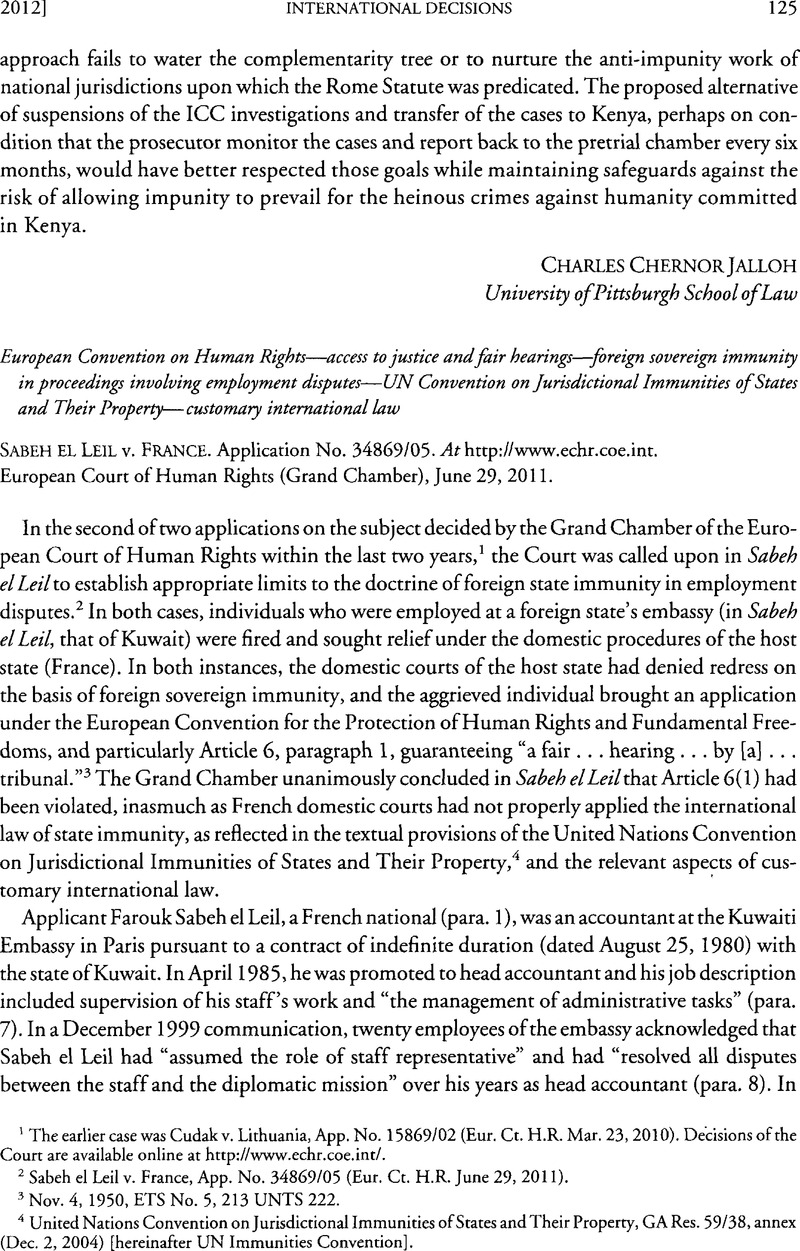Published online by Cambridge University Press: 20 January 2017

1 The earlier case was Cudak v. Lithuania, App. No. 15869/02 (Eur. Ct. H.R. Mar. 23,2010). Decisions of the Court are available online at http://www.echr.coe.int/.
2 Sabeh el Leil v. France, App. No. 34869/05 (Eur. Ct. H.R. June 29, 2011).
3 Nov. 4, 1950, ETS No. 5, 213 UNTS 222.
4 United Nations Convention on Jurisdictional Immunities of States and Their Property, GA Res. 59/38, annex (Dec. 2, 2004) [hereinafter UN Immunities Convention].
5 Vienna Convention on the Law of Treaties, opened for signature May 23, 1969, 1155 UNTS 331, 8 ILM 679 (1969) [hereinafter Vienna Convention].
6 See, e.g., Fogarty v. United Kingdom, 2001-XI Eur. Ct. H.R. 157; Al-Adsani v. United Kingdom, 2001-XI Eur. Ct. H.R. 79; Marius Emberland, Case Report: Fogarty v. United Kingdom, Al-Adsani v. United Kingdom, in 96 AJIL 699 (2002); see also Cudak, App. No. 15869/02.
7 See Cour de cassation soc, Mar. 31, 2009, Bull. civ. V, No. 92 (Fr.).
8 Cudak, paras. 70-72.
9 See UN Immunities Convention, supra note 4, annex, Understanding with Respect to Article 11 (“The reference in article 11, paragraph 2(d), to the ‘security interests’ of the employer State is intended primarily to address matters of national security and the security of diplomatic missions and consular posts.”).
10 France approved the 2004 UN Immunities Convention on August 12,2011. See United Nations, Multilateral Treaties Deposited with the Secretary-General, at http://treaties.un.org/ [hereinafter Multilateral Treaties]. Lithuania has taken no action at all with respect to the Convention. See id.
11 Cudak, paras. 66-67 (citing North Sea Continental Shelf (FRG/Den.; FRG/Neth.), 1969 ICJ REP. 3, 41, para. 71 (Feb. 20)).
12 See also Cudak, paras. 56-57; Fogarty v. United Kingdom, 2001-XI Eur. Ct. H.R. 157, paras. 35-36.
13 But see Cudak, Concurring Opinion of Judge Malinverni (noting that proper remedy may be reopening of Lithuanian proceedings, instead of awarding damages for a violation of Convention Article 6(1)).
14 Nowhere in the Grand Chamber’s decisions is the status of the Immunities Convention discussed in relation to Kuwait or Poland, the countries against which an employment claim was brought. Neither Kuwait nor Poland has signed the Convention, or taken any other action with respect to that treaty. See Multilateral Treaties, supra note 10.
15 See, e.g., Hazel Fox, the Law of State Immunity at x, 242-44, 308-09 (paperback ed. 2004 with new preface, corrections, supplementary bibliography, and updated table of cases) (2002) [hereinafter Fox 2004]; see also id. at 548-49 (2d ed. 2008) [hereinafter Fox 2008].
16 UN Immunities Convention, supra note 4, Art. 11(1).
17 See Fox 2004, supra note 15, at x n. 5 (quoting UK criticism of Article 11).
18 The Convention (at Article 30) requires thirty ratifications (or the equivalent action) to enter into force. As of October 14, 2011, there were only thirteen parties. See Multilateral Treaties, supra note 10.
19 See also Cudak v. Lithuania, App. No. 15869/02, para. 63 (Eur. Ct. H.R. Mar. 23,2010) (“[T]here was a trend in international and comparative law towards limiting State immunity in respect of employment-related disputes, with the exception, however, of those concerning the recruitment of staff in embassies.”) (citing Fogarty v. United Kingdom, 2001-XI Eur. Ct. H.R. 157, paras. 37-38).
20 Vienna Convention, supra note 5, Art. 18 (“A State is obliged to refrain from acts which would defeat the object and purpose of a treaty when: (a) it has signed the treaty or has exchanged instruments constituting the treaty subject to ratification, acceptance or approval, until it shall have made its intention clear not to become a party to the treaty….”).
21 Cudak, para. 66 (citing [1991] 2 Y.B. Int’l L. Comm’n, pt. 2, at 44, para. 14, UN Doc. A/CN.4/SER.A/1991 (Part 2) (discussing the 1991 draft articles, a rather truncated version of the text finally adopted in 2004; the 1991 draft Article 11 is reprinted in Cudak, para. 28)).
22 See id., paras. 22-23 (discussing the decisions of the Lithuanian Supreme Court of Dec. 21,2000, and Apr. 6, 2007).
23 Id., para. 66.
24 Id. But see id., Concurring Opinion of Judge Cabral Barreto (noting the “ambiguity” in the Grand Chamber’s holding).
25 Seventeen of the forty-seven members of the Council of Europe are signatories to the UN Immunities Convention. Of the seventeen, only eight have completed the ratification, accession, acceptance, or approval process. See Multilateral Treaties, supra note 10.
Only eight members have completed the ratification process of the European Convention on State Immunity, May 16, 1972, ETS No. 74, 1495 UNTS 182 (entered into force June 11, 1976). See European Convention on State Immunity, at http://www.conventions.coe.int/. Article 5 of the European Convention concerns employment disputes, but bears little resemblance in substance to Article 11 of the UN Immunities Convention, and has not been regarded as expressive of customary international law. See Fox 2004, supra note 15, at 305-07; Fox 2008, supra note 15, at 549.
26 See text at note 7 supra.
27 The Grand Chamber clearly rejected the argument that Sabeh el Leil had greater “governmental authority” than the applicant in Cudak, by virtue of his functions as an unofficial staff representative (paras. 62-64). But this was a procedural ruling, based on the lack of appropriate “documents or facts” found by the Paris Court of Appeal (para. 64).